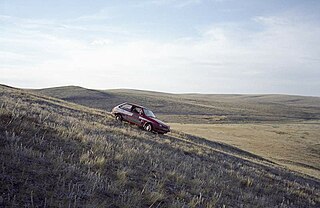
The Plymouth-Banjul Challenge or unofficially the Ultimate Banger Challenge and previously known as the Plymouth-Dakar Challenge, is an annual car event for charity. It is not a race or a competition as its website states. It was first run in 2003 to Dakar and since 2005 to Banjul. It very roughly follows the route of the more famous Dakar Rally, visiting many of the same countries.

A charity shop (British English), thrift shop or thrift store or opportunity shop is a retail establishment run by a charitable organization to raise money. Charity shops are a type of social enterprise. They sell mainly used goods such as clothing, books, music albums, shoes, DVDs, toys, and furniture donated by members of the public, and are often staffed by volunteers. Because the items for sale were obtained for free, and business costs are low, the items can be sold at competitive prices. After costs are paid, all remaining income from the sales is used in accord with the organization's stated charitable purpose. Costs include purchase and/or depreciation of fixtures, operating costs and the building lease or mortgage.

Fundraising or fund-raising is the process of seeking and gathering voluntary financial contributions by engaging individuals, businesses, charitable foundations, or governmental agencies. Although fundraising typically refers to efforts to gather money for non-profit organizations, it is sometimes used to refer to the identification and solicitation of investors or other sources of capital for for-profit enterprises.

Street fundraising consists of various ways of asking for donations on behalf of a charity. Those asking for donations may be paid employees of the charity, or they may be volunteers.

The Mongol Rally is an intercontinental car rally that begins in Europe and ends in Ulan-Ude, Russia. The rally originally ended in Ulaanbaatar, Mongolia. However, to avoid punitive costs and taxes associated with vehicle imports and disposal, the rally now passes through Mongolia and ends in Ulan-Ude. The principal launch is from Goodwood Circuit in the United Kingdom, with subsidiary starting points in the Czech Republic. There are three fundamental rules to the rally:
- Rally vehicles have a 1200cc engine limit, but ideally under 1000cc
- Rally teams are unsupported
- Rally teams need to raise at least £500 for charity

The Budapest-Bamako or Great African Run is a charity car race in Africa, and the largest amateur rally in the world. It is a low-budget version of the Dakar Rally, and goes from Budapest, Hungary to Bamako, Mali through the Sahara. It passes through Hungary, Austria or Slovenia, Italy, France, Spain, Morocco, Western Sahara, Mauritania and Mali. The Budapest-Bamako was inspired by the Paris-Dakar Rally. There are few entry restrictions: as long as a vehicle is street legal, it can join the event. The event also raises money and supplies for local communities and charities in Mali.
Charity fraud is the act of using deception to get money from people who believe they are making donations to charities. Often a person or a group of people will make material representations that they are a charity or part of a charity and ask prospective donors for contributions to the non-existent charity. Charity fraud not only includes fictitious charities but also deceitful business acts. Deceitful business acts include businesses accepting donations and not using the money for its intended purposes, or soliciting funds under the pretense of need.
The Indian Autorickshaw Challenge is an international autorickshaw rally. The entrants use the autorickshaw or tuk-tuk, a common vehicle of India's urban east, to cross large portions of the Indian sub-continent over a period several of days. The simple construction of the autorickshaw and the diversity of the landscape requires the participants to be resourceful and determined in order to finish the course. The event is organised by Chennai Event Management Services.

The Mongolia Charity Rally is the charity rally from London to the capital of Mongolia, Ulaanbaatar. The Mongolia Charity Rally is organised by Charity Rallies, part of Go Help, a UK-based charity.

CrowdRise is a for-profit crowdfunding platform that raises charitable donations. CrowdRise was founded by Edward Norton, Shauna Robertson, and the founders of Moosejaw, Robert and Jeffrey Wolfe. CrowdRise was acquired in 2017 by GoFundMe.
The H.O.P.E. Beach Volleyball Charity Tournament is a philanthropic volleyball tournament that aims at earning money and gaining awareness on behalf of various charitable organizations. The first tournament took place in the summer of 1989, in Ottawa Ontario at Britania Beach and moved to Mooney's Bay Beach a few years later and continues at Money's Bay Beach today. The tournament is completely nonprofit and is put together by unpaid volunteers. The program normally reaches out to smaller, local charitable organizations. The tournament is held in Canada, on Toronto Island and in Ottawa, Ontario. The acronym H.O.P.E. stands for "Helping Other People Everywhere". The tournaments take place annually during the summer months.
The Silk Road Race is a charity rally from Milan to the capital of Tajikistan, Dushanbe. The Silk Road Race is organised by Partenza Intelligente, a non-profit cultural association based in Lainate (Milan) Italy. The first edition of the rally was launched 31 July 2010.
Omaze is an American for-profit fundraising company which partners with charities in fundraising events. Omaze's events feature prizes, such as material goods, property, or celebrity experiences, usually with one grand prize and several lesser prizes. In order to enter the draw for the prizes, financial contributions are encouraged, with 15% to 60% of the money going to the partner charity.

BT MyDonate was a not-for-profit online fundraising service provided by United Kingdom telecommunications company BT Group for charities in the UK, and was launched on 6 April 2011 as part of BT's investment to the community. It closed on 30 June 2019 so BT can focus its support in other areas including how they'll continue to support charities, and due to the many alternative fundraising platforms available, including several fee-free offers, to the UK.

The Baja 4000 is a biennial off-road charity rally and road trip organized by the creators of the largest amateur rally in the world, the Budapest-Bamako. It's a low budget, amateur version of the famous Baja 1000 and Dakar Rally. The first edition was held in January 2017. The rally started in Los Angeles and traveled 4000 kilometers on the Baja California peninsula in Mexico. In 2018 before the second edition of the event organizers changed the event's name to Baja XL.

The Donald J. Trump Foundation was a New York-based tax-exempt private foundation formed in 1988 by Donald Trump and existed until its court-ordered and court-supervised dissolution in 2019. It was formed by Trump to receive his share of the royalties from his book Trump: The Art of the Deal, as well as donations from outsiders, to be applied to charitable causes. Trump served as its president until January 2017, three days after his inauguration as U.S. President. Trump's three adult children – Ivanka, Eric and Donald Jr. – all served on the board, which had not met after 1999. Trump stopped contributing to the foundation in 2008, but continued to solicit donations.
Circle of Friends for American Veterans (COFAV) was a 501(c)(3) organization that supported veterans and related causes. It was founded in 1993 in Falls Church, Virginia, by Brian Arthur Hampton. The charity is criticized for spending about 10% of their income for charitable causes, with the remainder being paid to fundraisers.
The Baja XL is a biennial off-road charity rally and road trip organized by the creators of the largest amateur rally in the world, the Budapest-Bamako. It is the successor of the Baja 4000. It's a low budget, amateur version of the famous Baja 1000 and Dakar Rally. The first edition was held in January 2017. The rally started in Los Angeles and traveled 4000 kilometers on the Baja California peninsula in Mexico. In 2018 before the second edition of the event organizers changed the event's name from Baja 4000 to Baja XL. From Jan 29-Feb 7, 2019 the second edition was held with 120 teams entering the event.
The Shitbox Rally is a long-distance motoring event run in Australia as a fundraiser for cancer research charities, originally an annual event but increased to twice-yearly in 2019.

The COVID-19 pandemic has greatly impacted the international and domestic economies. Thus, many organizations, private individuals, religious institutions and governments have created different charitable drives, concerts and other events to lessen the economic impact felt.











